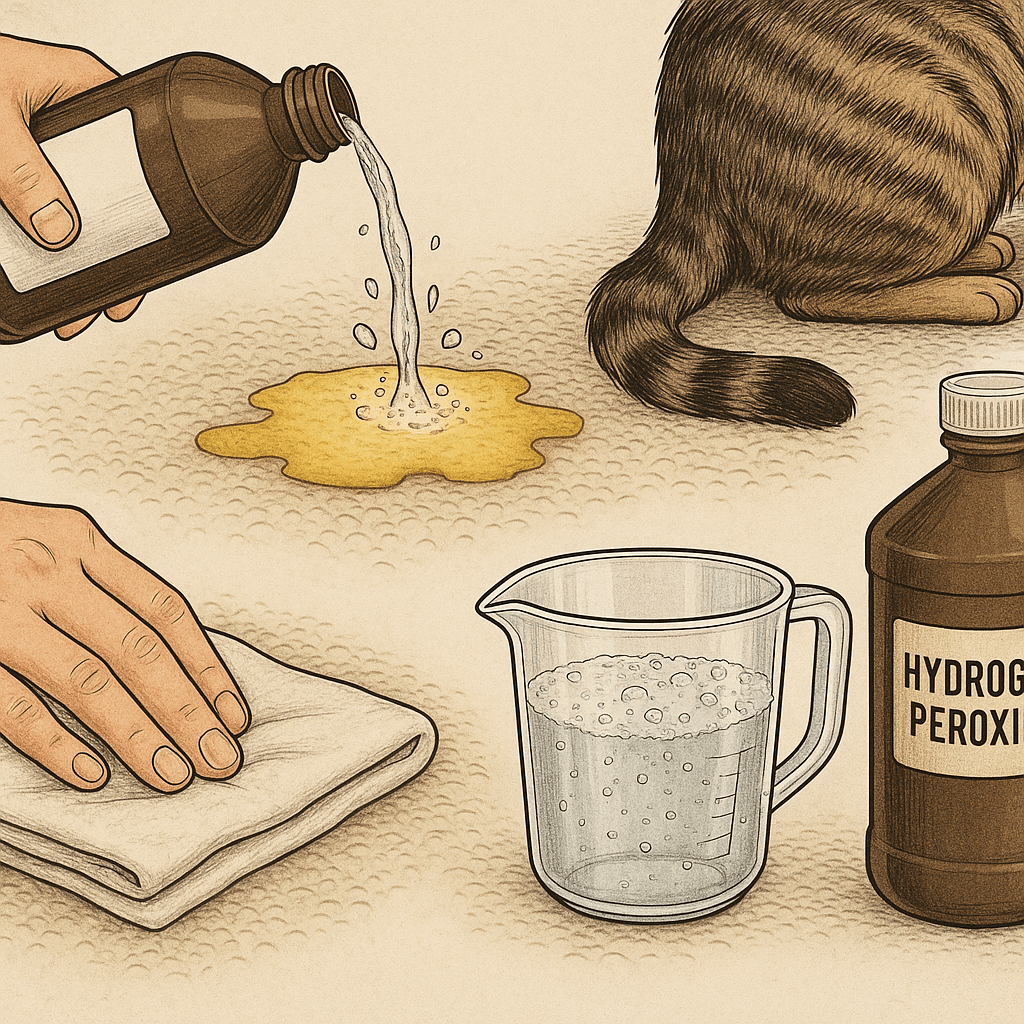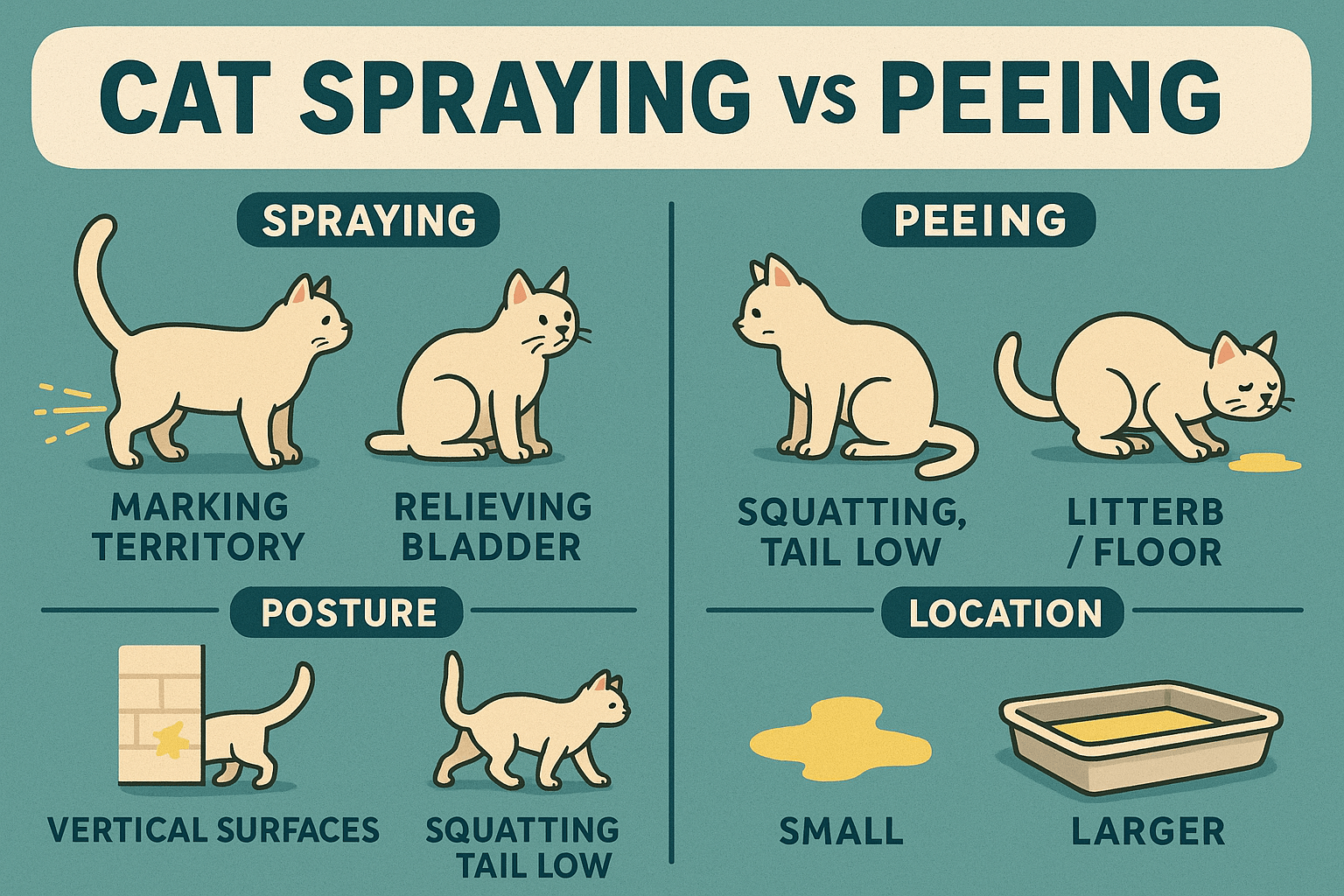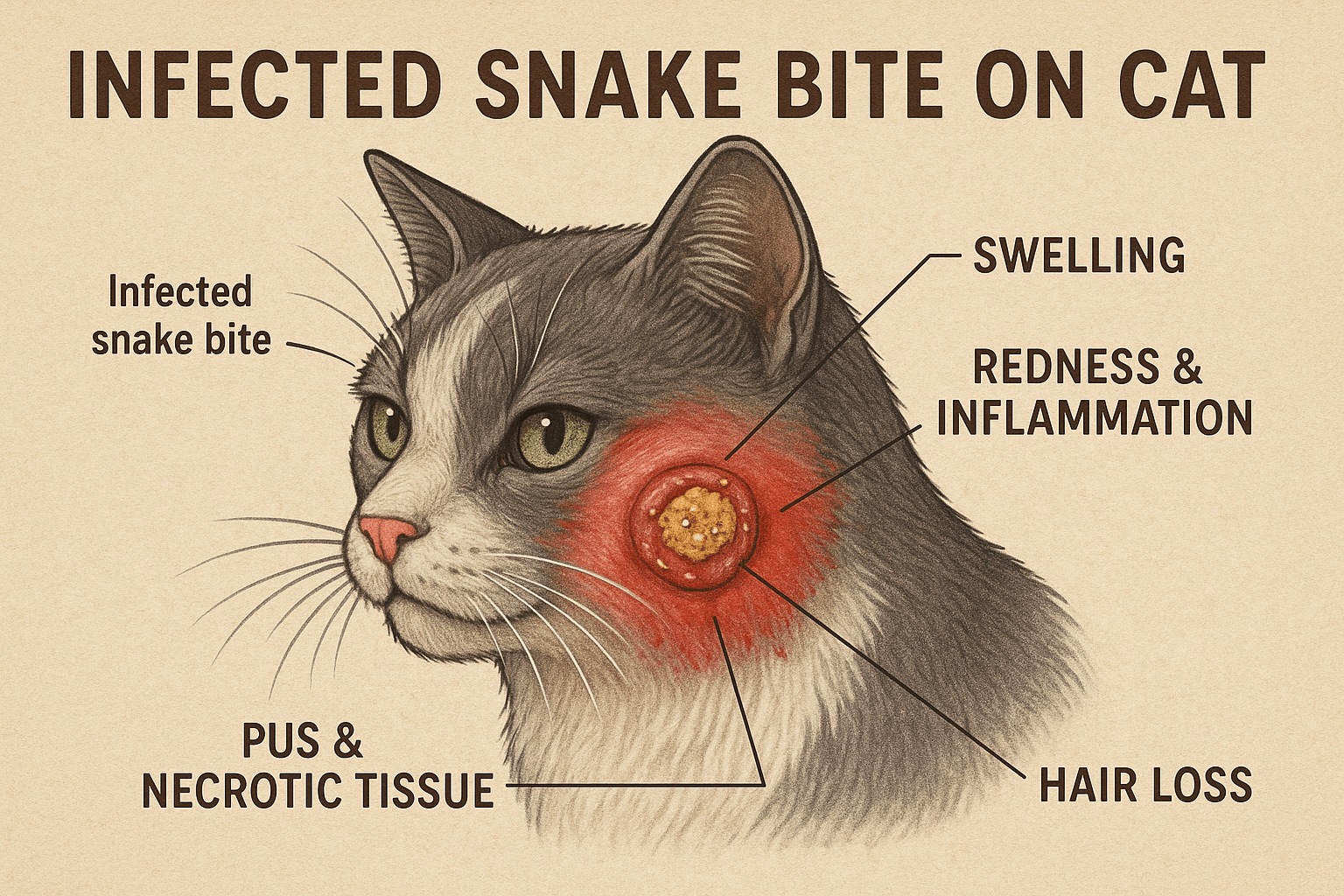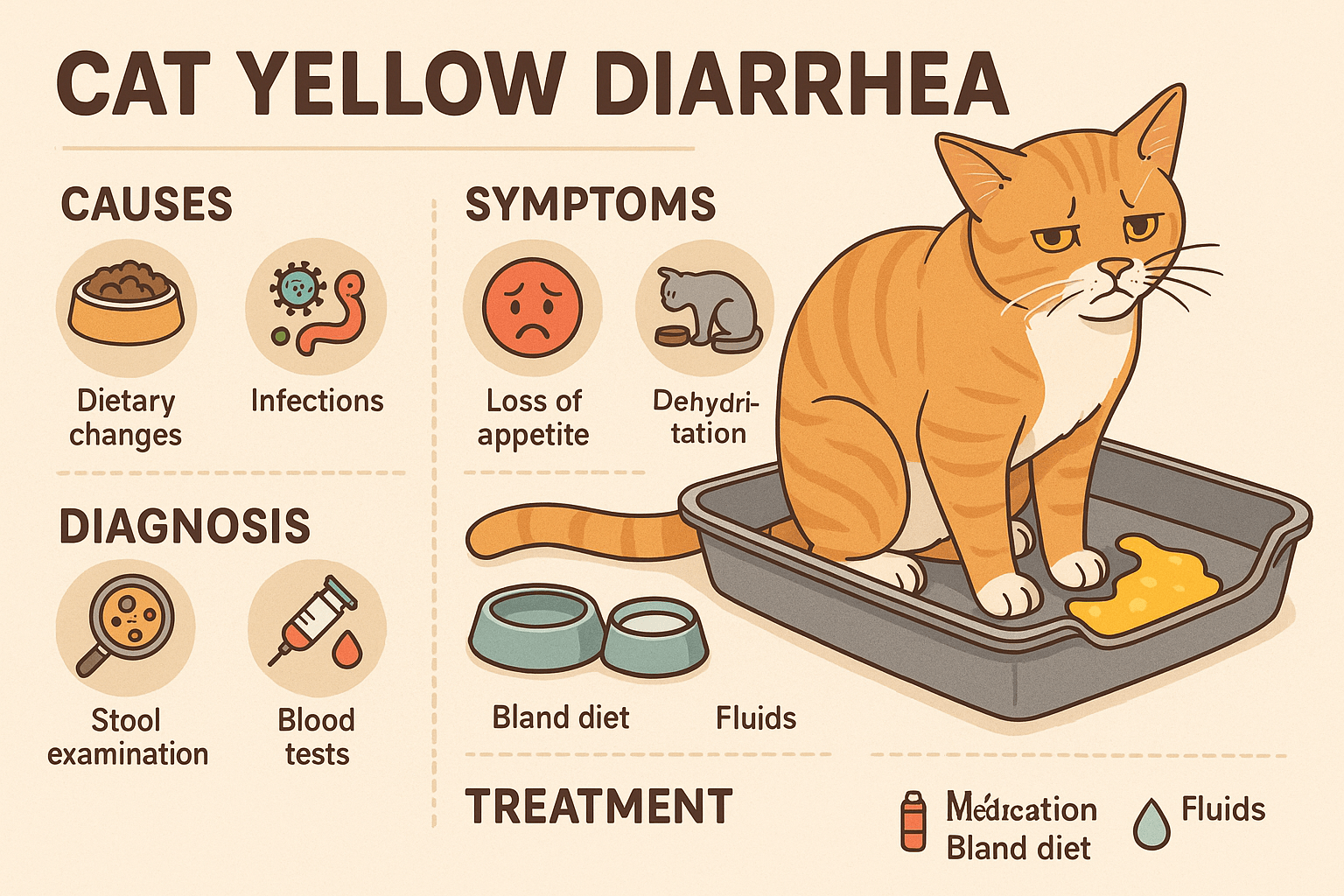Hydrogen Peroxide for Cat Urine: Is It Safe and Effective?
Dealing with cat urine can be a frustrating challenge for pet owners. Whether it’s an accidental indoor accident or a persistent marking habit, the smell of cat urine can linger long after the initial incident. Many people turn to household cleaning solutions, such as hydrogen peroxide, in hopes of tackling this stubborn odor. But is hydrogen peroxide a safe and effective option for removing cat urine stains and smells? In this blog post, we’ll explore how hydrogen peroxide works, its potential benefits and risks, and alternative methods to keep your home fresh and clean while ensuring your cat’s safety.
How Hydrogen Peroxide Works on Cat Urine
Hydrogen peroxide is a popular cleaning agent known for its ability to break down organic compounds, including those found in cat urine. However, understanding its mechanism and limitations is crucial before using it in your home.
Oxidation Process:
Hydrogen peroxide works by releasing oxygen molecules that break down odor-causing compounds in cat urine, neutralizing the smell at its source.Stain Removal Capabilities:
The bubbling action of hydrogen peroxide helps lift and dissolve urine stains from fabrics, carpets, and hard surfaces.Disinfectant Properties:
As a mild disinfectant, hydrogen peroxide can kill bacteria and germs often associated with pet accidents, reducing the risk of lingering odors.Effectiveness on Fresh vs. Old Stains:
Hydrogen peroxide works best on fresh urine stains; older stains may require additional treatments to fully eliminate odors.Safety Precautions:
Always test hydrogen peroxide on a small, inconspicuous area first to avoid discoloration or damage to sensitive materials.
While hydrogen peroxide can be effective, it’s important to use it carefully and consider its limitations when dealing with cat urine.

Step-by-Step Guide to Using Hydrogen Peroxide on Cat Urine
If you decide to use hydrogen peroxide to clean cat urine, following the correct steps ensures both safety and effectiveness. Here’s a simple guide to help you get started.
Blot the Area Thoroughly:
Use paper towels or a clean cloth to absorb as much urine as possible before applying any cleaning solution.Mix a Cleaning Solution:
Combine 3% hydrogen peroxide with a small amount of dish soap and water to create a gentle yet effective cleaning mixture.Apply the Solution Generously:
Pour or spray the solution onto the stained area, ensuring it penetrates deep into the fibers or surface.Scrub Gently:
Use a soft brush or sponge to scrub the area lightly, helping to lift the stain without causing damage.Allow Time to Sit:
Let the solution sit for 5-10 minutes before blotting it dry with a clean towel. Repeat if necessary for stubborn stains.
By following these steps, you can maximize the cleaning power of hydrogen peroxide while minimizing the risk of damage.
Check this guide 👉Understanding Kidney Stones in Cat Urine: Best 7 Tips!
Check this guide 👉Cat Urine High pH: Best 7 Expert Tips!
Check this guide 👉Symptoms of Ammonia Poisoning from Cat Urine: Best 7 Tips!
Pros of Using Hydrogen Peroxide | Cons of Using Hydrogen Peroxide |
|---|---|
Effective at breaking down organic matter | Can bleach or discolor fabrics |
Affordable and widely available | May not work on old or set-in stains |
Kills bacteria and neutralizes odors | Requires careful testing on surfaces |
Easy to mix with other cleaning agents | Can irritate pets if not rinsed properly |
Eco-friendly compared to harsh chemicals | Not suitable for all materials |
Common Mistakes to Avoid When Using Hydrogen Peroxide
While hydrogen peroxide can be a useful tool for cleaning cat urine, mistakes during application can lead to unsatisfactory results or unintended damage. Avoid these common pitfalls to ensure success.
Using Undiluted Hydrogen Peroxide:
Applying undiluted hydrogen peroxide can cause bleaching or damage to fabrics and surfaces. Always dilute it with water.Skipping the Patch Test:
Failing to test the solution on a hidden area first may result in permanent discoloration or damage.Overusing the Solution:
Excessive application can saturate surfaces, leading to longer drying times and potential mold growth.Ignoring Safety Gear:
Wear gloves and ensure proper ventilation to protect yourself from skin irritation or inhalation risks.Not Rinsing After Cleaning:
Residual hydrogen peroxide can irritate pets or attract them to the cleaned area. Always rinse thoroughly with water.
By avoiding these mistakes, you can use hydrogen peroxide safely and effectively.
Alternative Cleaning Solutions for Cat Urine
If hydrogen peroxide isn’t the right fit for your needs, there are plenty of other cleaning options that can tackle cat urine stains and odors.
Enzyme-Based Cleaners:
These cleaners specifically target the proteins in cat urine, breaking them down completely to eliminate odors permanently.Baking Soda and Vinegar:
A combination of baking soda and vinegar creates a natural, non-toxic cleaning solution that absorbs odors and lifts stains.Professional Carpet Shampoos:
Specially formulated carpet shampoos can penetrate deep into fibers, removing stubborn urine residues.Odor Neutralizers:
Products designed to neutralize odors rather than mask them can be highly effective for persistent smells.Steam Cleaning:
High-temperature steam cleaning can sanitize surfaces and remove embedded urine particles without harsh chemicals.
Exploring these alternatives ensures you find the best solution for your specific cleaning needs.
Signs Your Cat Has a Urine Problem
Identifying the root cause of cat urine issues is crucial for preventing future accidents. Look out for these signs that indicate your cat may need attention or behavioral intervention.
Frequent Accidents Outside the Litter Box:
If your cat consistently avoids the litter box, it could signal stress, illness, or dissatisfaction with the litter setup.Marking Behavior:
Spraying or marking territory often occurs due to territorial instincts or anxiety, especially in multi-cat households.Changes in Urination Habits:
Increased frequency or difficulty urinating may point to urinary tract infections or other health issues.Strong Odor in Specific Areas:
Lingering urine smells in certain spots suggest repeated accidents or incomplete cleaning.Behavioral Changes:
Cats hiding, acting aggressively, or showing signs of discomfort may be experiencing underlying problems.
Addressing these signs promptly can prevent recurring urine issues and strengthen your bond with your cat.
Preventing Future Cat Urine Problems
Prevention is always better than cure when it comes to managing cat urine. Implementing proactive strategies can minimize accidents and maintain a clean home.
Provide Multiple Litter Boxes:
Ensure there’s one litter box per cat, plus an extra, to reduce competition and encourage proper bathroom habits.Choose the Right Litter:
Experiment with different types of litter to find what your cat prefers, whether it’s clumping, non-clumping, scented, or unscented.Keep the Litter Box Clean:
Scoop daily and change the litter weekly to maintain hygiene and appeal for your cat.Reduce Stress Triggers:
Minimize changes in your cat’s environment and provide enrichment through toys, scratching posts, and playtime.Schedule Regular Vet Checkups:
Routine vet visits help detect and address potential health issues early, preventing urine-related problems.
Taking these preventive measures fosters a healthier and happier living space for both you and your cat.
Natural Remedies for Cat Urine Odors
For those seeking eco-friendly and non-toxic solutions, natural remedies can effectively combat cat urine smells without harsh chemicals.
Baking Soda Paste:
Mix baking soda with water to form a paste, apply it to the affected area, and let it sit before vacuuming it up.White Vinegar Spray:
Combine equal parts white vinegar and water in a spray bottle to neutralize odors on carpets and fabrics.Lemon Juice Solution:
Add a few drops of lemon juice to water for a fresh-smelling cleaner that also discourages cats from revisiting the spot.Essential Oils (Pet-Safe):
Certain oils like lavender or chamomile can mask odors when diluted properly, though they should never be applied directly to pets.Activated Charcoal:
Place activated charcoal near problem areas to absorb lingering smells naturally.
These natural remedies offer safe and sustainable ways to tackle cat urine odors while protecting your home and your pet’s well-being.
Frequently Asked Questions About Hydrogen Peroxide and Cat Urine
Is hydrogen peroxide safe for pets?
Yes, when used correctly and rinsed thoroughly, hydrogen peroxide is generally safe for pets. However, avoid direct contact with their skin or fur.
Can I use hydrogen peroxide on colored fabrics?
It’s best to test on a small area first, as hydrogen peroxide can bleach or discolor certain materials.
What concentration of hydrogen peroxide should I use?
Stick to 3% hydrogen peroxide, which is safe for household cleaning and readily available in stores.
Will hydrogen peroxide remove old cat urine smells?
It may reduce the odor but might not fully eliminate deeply set-in smells. Enzyme-based cleaners are more effective for older stains.
Can I mix hydrogen peroxide with other chemicals?
No, mixing hydrogen peroxide with other chemicals like bleach can produce toxic fumes. Always use it with water or mild soap.
Finding the Right Solution for Cat Urine Cleanup
Cleaning up cat urine doesn’t have to be a daunting task. While hydrogen peroxide offers an affordable and accessible option, it’s essential to weigh its pros and cons and follow proper usage guidelines. For tougher stains or persistent odors, alternative solutions like enzyme-based cleaners or professional-grade products may provide better results. By staying informed and experimenting with different methods, you can keep your home fresh and welcoming while maintaining a harmonious environment for your feline friend. Remember, patience and consistency are key to tackling even the toughest messes!
Cat Spraying vs. Peeing: Best 7 Expert Tips! Learn to identify the differences, understand causes, and stop unwanted behaviors with proven strategies for a cleaner, stress-free home.
Infected Snake Bite on Cat: Best 7 Expert Tips! Learn how to identify, treat, and prevent snake bites in cats, ensuring their safety and speedy recovery with expert advice.
Cat Yellow Diarrhea: Best 7 Expert Tips! Discover expert advice on causes, symptoms, and solutions for cat yellow diarrhea to keep your feline healthy and happy.
Why Do Cats Bring You Dead Animals? Best 7 Expert Tips! Discover the reasons behind this behavior and learn how to handle it with expert advice on cat instincts, bonding, and wildlife protection.




